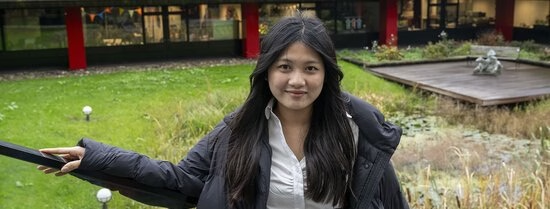Christy Lin is following the master Healthcare Management at Erasmus School of Health Policy & Management this year. In addition, she has been working as a student assistant at Erasmus School of Social and Behavioural Sciences for over two years. She hopes to contribute to good patient education after completing her master's.
‘It’s funny how I ended up at ESSB’, says Lin. ‘As part of my bachelor’s degree at Erasmus School of Health Policy & Management, I followed a minor in Artificial Intelligence and Society at ESSB. Then, a vacancy for a student assistant at ESSB came up, and I was hired.’ At ESSB, that interest in AI comes in handy. Lin is involved in the AICON project, among other things. In this project, residents, artists and scientists work together to involve everyone interested in artificial intelligence in the possibilities. This is done through workshops in Rotterdam-Zuid. For that project, Lin also regularly posts on the project’s social media channels.
Media literacy
Social media ties in with Ying Chuck’s PhD research. She is researching media literacy in and with children for the Movez Lab. For children, computers, tablets and smartphones are a given. However, children can be vulnerable to the temptations and enticements of online possibilities, which is why it is essential to make them media-savvy. Chuck and Lin have discussed the advantages and disadvantages of the online world and how to adjust the disadvantages in various meetings at Rotterdam primary schools in the upper grades. This type of research is called YPAR: Youth Participatory Action Research. The starting point is that the students are just as knowledgeable as the researcher. The students learn to think about their behaviour and solutions and, at the same time, develop their research and reflection skills. ‘I have a brother and sister who are 7 and 9,’ says Lin. ‘It is a horrible idea that they already have to worry about, for example, online stalkers. But it is the reality.’
Risks
Students Chuck and Lin spoke to during the research indicate that hacking is a disadvantage of the online world, just like negative comments on social media and online bullying. Suggestions from the students to deal with the disadvantages include hacking back, using a VPN connection and spending less time on social media. These sessions teach them to reflect, which makes the students pay more attention to what they post online. ‘For me, it is also an eye-opener,’ says Lin. ‘Sometimes I just enjoy sharing something online with my friends, and then I don’t think that random people can see it too.’
Students also indicate that using social media is addictive. They compare their screen time with each other and also reflect in that way. ‘I also notice that it is addictive’, laughs Lin. ‘I have recently reduced my screen time.’ She grabs her phone and looks it up: 3.5 hours of screen time in the past week. That makes her happy. ‘I noticed that I was scrolling through my timeline for a long time and almost mindlessly. I didn’t like that idea. And I missed reading books. But it is also interesting. For example, I received a message from a foreign number today with ‘hello’. Nothing else. Then I wondered who the message came from. Maybe it is important.’
AI and healthcare
In addition to the online world, Lin is very interested in other technological developments, such as artificial intelligence. AI, in combination with healthcare, in particular, fascinates her. ‘I have an affinity with technology and the social side of healthcare. What can you do with AI to ensure patients receive the information they need?’ According to Lin, the development is happening quickly and almost unnoticed: ‘It won’t be long before, for example, an AI GP does a preliminary examination. This allows a doctor to work more efficiently, but it may be at the expense of personal contact with a patient. I think it’s an exciting development.’
As a diabetes patient, Lin knows from experience that accessing the right information is not always easy. She does not always want to ‘bother’ healthcare providers with her questions and, therefore, regularly searches for information online, but she often comes across contradictory details there. That is why Lin realises better than anyone how great it would be if the provision of information could contribute to what a patient needs. You have all the answers you need when you leave the consultation room. ‘It would be great if there was good online patient information. For example, a site about diabetes that is understandable for everyone, easy to search, has many illustrations and explanatory videos and provides information in different languages. On that site, you should also be able to ask a specific question to which AI, or the chat box, quickly provides a complete and correct answer.’
By combining the Master's in Healthcare Management and AI, Li hopes she can contribute to providing exemplary patient information. ‘I would prefer to do that in a hospital, where a lot is happening, so I can contribute in many areas. Then, my work has an impact. I would prefer to do that in Rotterdam, where I grew up, which is very international and where I feel at home.’
The Master is a step towards that goal. Lin: ‘I have to read a lot and do a lot of assignments, and I am looking forward to my thesis. I just really enjoy doing research.’
- More information
This interview is part of Spark. With these interviews, we aim to draw attention to the positive impact of the faculty's education and research on society. The stories in Spark give an insight into what makes ESSB students, alumni, staff and researchers tick.
Contact: Britt van Sloun, redactie en communicatie ESSB, vansloun@essb.eur.nl

